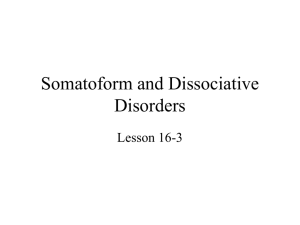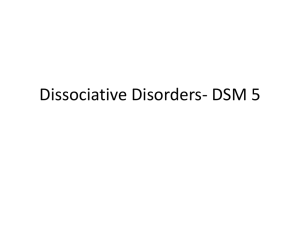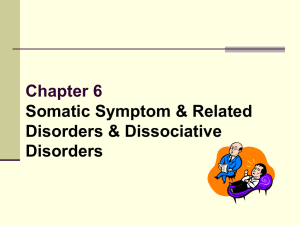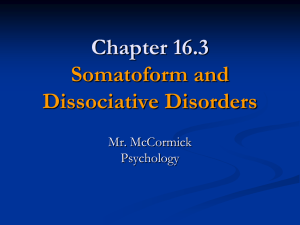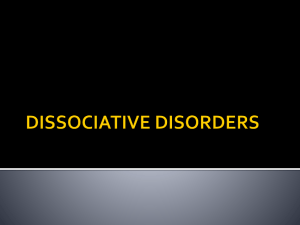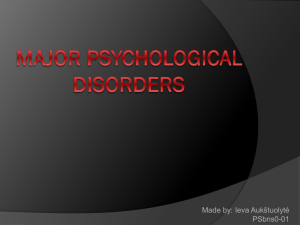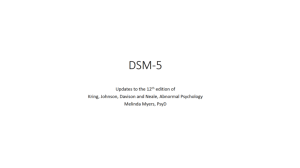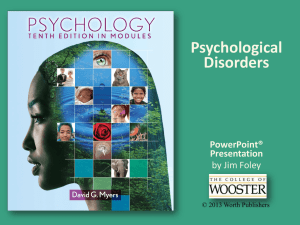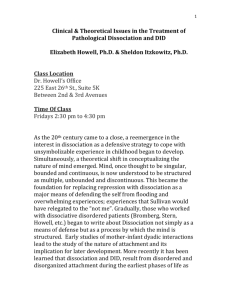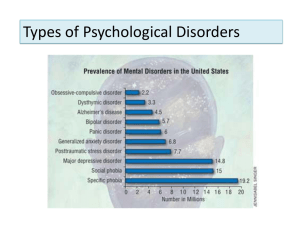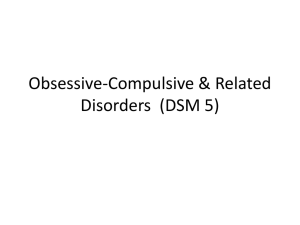The Dissociative Disorders - Southern Ohio Medical Center
advertisement
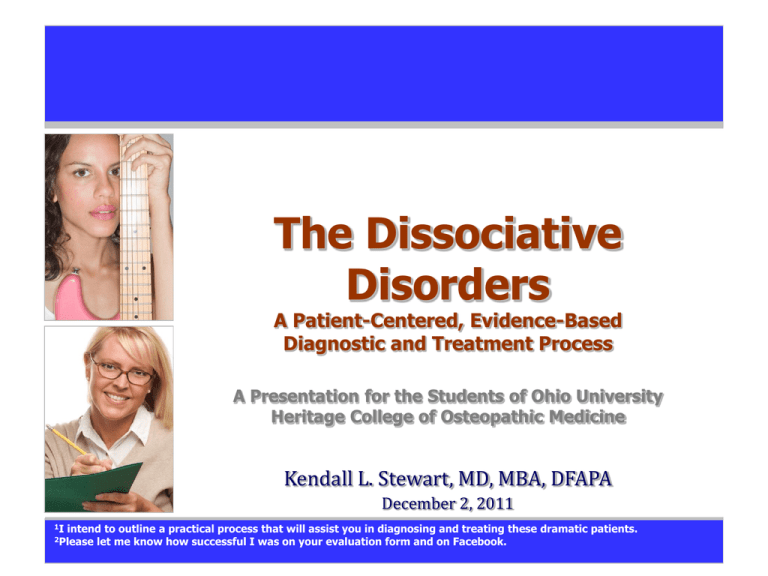
The Dissociative Disorders A Patient-Centered, Evidence-Based Diagnostic and Treatment Process A Presentation for the Students of Ohio University Heritage College of Osteopathic Medicine Kendall L. Stewart, MD, MBA, DFAPA December 2, 2011 1I intend to outline a practical process that will assist you in diagnosing and treating these dramatic patients. let me know how successful I was on your evaluation form and on Facebook. 2Please Why does this matter? • These dramatic disorders are fairly common, and they are challenges for those who care for them. • The essential features include a disruption in the integrated functions of – – – – Consciousness, Memory, Identity, or Perception. • These disturbances may be sudden, gradual, transient or chronic. 1This • After mastering the information in this presentation, you will be able to – Specify the diagnostic criteria for each of the disorders in this category, – Describe how the typical patient with Dissociative Identity Disorder (DID)—or Multiple Personality Disorder (MPD)—presents, – Outline a preliminary treatment plan for DID patients1,2, and – Discuss some of the formidable treatment challenges in these cases. diagnosis remains controversial. was trained in Augusta with “The Three Faces of Eve,” and Athens, Ohio is a hotbed of “Multiples.” 3You can see the real Chris Sizemore on YouTube. 2I What diagnoses are included in the Dissociative Disorders category? • • • • • Dissociative Amnesia Dissociative Fugue Dissociative Identity Disorder Depersonalization Disorder Dissociative Disorder NOS What are the diagnostic criteria for Dissociative Amnesia? • Cannot recall important personal information—usually of a traumatic or stressful nature—and too extensive to be explained by ordinary forgetfulness • Not due to – – – – – – – Dissociative Identity Disorder Dissociative Fugue Somatization Disorder Posttraumatic Stress Disorder Acute Stress Disorder Substance use Neurological or General Medical Condition • Causes significant impairment in social or occupational functioning1,2,3 1Dissociation is a common phenomenon. hypnosis and “freeway hypnosis.” 3Dissociation commonly occurs in religious rituals. 2Consider What are the diagnostic criteria for Dissociative Fugue? • Sudden, unexpected travel away from home or work and the inability to recall one’s past1 • Confusion about personal identity or partial or complete assumption of a new identity • Not due to something else • Causes significant distress or impairment in social or occupational functioning 1Let me tell you about a retired physician who “ran away” to Huntington. What are the diagnostic criteria for Dissociative Identity Disorder? • The presence of two or more distinct identities or personalities (each with its own relatively enduring pattern of perceiving, relating to, and thinking about the environment and self) • At least two of these identities recurrently take control of the person’s behavior1 • Inability to recall important information that cannot be explained by ordinary forgetfulness • Not due to something else • (Significant impairment is assumed) 1One of my patient’s personalities called me precisely at 3 AM several nights in a row. What are the diagnostic criteria for Depersonalization Disorder?1 • Persistent or recurring perceptions of feeling detached from one’s mental processes or body (feeling like one is in a dream) • Reality testing remains intact • Not due to something else • Causes significant distress or impairment in social or occupational functioning 1I have never made this diagnosis; I always see it as a symptom of anxiety. How can you keep these patients straight? No Memory loss? Yes Altered sense of self or reality? Travel to another place? Depersonalization Disorder No Yes Evidence of more than one identity? Dissociative Fugue No Yes Dissociative Amnesia Dissociative Identity Disorder What is the biological basis of the Dissociative Disorders?1 • Neuroanatomical, neurophysiological and neurochemical processes are being clarified. • The hippocampus plays a central role. • Neurotransmitters play key roles in short-term and long-term memory. • Learning is often state dependent. • Memory of a traumatic event is encoded during that event and may be difficult or impossible to recall outside that context. 1 Kaplan & Sadock, 2003 What treatments are indicated and what challenges may appear? • • • • • Dissociative Amnesia • Cognitive therapy may be helpful in patients with a history of trauma • Hypnosis may play a helpful role in modulating arousal. • Medication is not helpful. • Group therapy may offer support, education and insight. Dissociative Fugue • These patients are best treated with supportive therapy. • Impulse control issues usually emerge as the repressed conflicts emerge. Dissociative Identity Disorder • Intensive psychotherapy is the treatment of choice. • Therapeutic curiosity can make this condition much worse. • Medication may be helpful for symptom relief. Depersonalization Disorder • These patients are often refractory to psychotherapy and medication. Dissociative Disorder NOS Where can you learn more? • • • • • • • • • • American Psychiatric Association, Diagnostic and Statistical Manual of Mental Disorders, Fourth Edition, Text Revision, 2000 Sadock, B. J. and Sadock V. A., Concise Textbook of Clinical Psychiatry, Third Edition, 2008 Stern, et. al., Massachusetts General Hospital Comprehensive Clinical Psychiatry, 2008. You can read this text online here. Flaherty, AH, and Rost, NS, The Massachusetts Handbook of Neurology, April 2007 Stead, L, Stead, SM and Kaufman, M, First Aid© for the Psychiatry Clerkship, Second Edition, March 2005 Klamen, D, and Pan, P, Psychiatry Pre Test Self-Assessment and Review, Twelfth Edition, March 20093 Oransky, I, and Blitzstein, S, Lange Q&A: Psychiatry, March 2007 Ratey, JJ, Spark: The Revolutionary New Science of Exercise and the Brain, January 2008 Medina, John, Brain Rules: 12 Principles for Surviving and Thriving at Home, Work and School, February 2008 Stewart KL, “Dealing With Anxiety: A Practical Approach to Nervous Patients,” 2000 Where can you find evidence-based information about mental disorders? • • • • • • • Explore the site maintained by the organization where evidence-based medicine began at McMaster University here. Sign up for the Medscape Best Evidence Newsletters in the specialties of your choice here. Subscribe to Evidence-Based Mental Health and search a database at the National Registry of Evidence-Based Programs and Practices maintained by the Substance Abuse and Mental Health Services Administration here. Explore a limited but useful database of mental health practices that have been "blessed" as evidence-based by various academic, administrative and advocacy groups collected by the Iowa Consortium for Mental Health here. Download this presentation and related presentations and white papers at www.KendallLStewartMD.com. Learn more about Southern Ohio Medical Center and the job opportunities there at www.SOMC.org. Review the exceptional medical education training opportunities at Southern Ohio Medical Center here. How can you contact me?1 Kendall L. Stewart, M.D. VPMA and Chief Medical Officer Southern Ohio Medical Center Chairman & CEO The SOMC Medical Care Foundation, Inc. 1805 27th Street Waller Building Suite B01 Portsmouth, Ohio 45662 740.356.8153 StewartK@somc.org KendallLStewartMD@yahoo.com www.somc.org www.KendallLStewartMD.com 1Speaking and consultation fees benefit the SOMC Endowment Fund. Are there other questions? Sarah Ann Flaherty, DO OUCOM 2003 Kevin Kammler, DO OUCOM 1993 Safety Quality Service Relationships Performance
